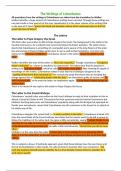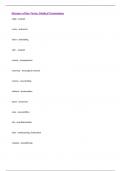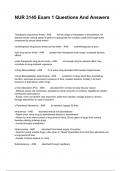The Writings of Columbanus
All quotations from the writings of Columbanus are taken from the translation by Walker
Unlike Colmcille, a huge amount of Columbanus writings have survived. Through these writings we
can paint quite a clear portrait of the man. Nonetheless it is the sheer volume of his writings that
in the view of O Fiaich "places him head and shoulders above all his contemporaries as the first
great Irish man of letters”
The Letters
The Letter to Pope Gregory the Great
This first Letter was written in 600 to Pope Gregory the Great. The background to the Letter is the
Paschal Controversy. He is indeed most concerned about the Easter question. The Letter shows
dearly that Columbanus is something of a computist and is aware of the long history of the prob-
lem and variety of Paschal Tables which were in use as well as their limitations. O Crónin com-
ments on the "obvious confidence” Columbanus shows in the Letter "about his abilities in the
field”.
Walker identifies the tone of the Letter as "firm, but respectful.” Though Columbanus "recognizes
Rome's authority" he "shows no tendency to compromise" He makes clear that his purpose in
writing is to "ask about Easter", which he calls "the matter of my grief.” After showing his depth of
knowledge on the matter, Columbanus makes it clear that he is looking to Gregory for the
"quelling of the storm that surrounds us". He reminds the pope that those who are bringing the
charge against him of "celebrating Easter with the Jews", are themselves guilty of simony and “or-
dain uncanonically.” As he ends the letter, he emphasises again, "it is my heart's desire to pay you
honour due".
There is no record of any reply to this Letter to Pope Gregory the Great.
The Letter to the French Bishops
Columbanus' second Letter was written to the French bishops in reply to their invitation to him to
attend a Synod at Chalon in 603. The pretext for their summons was the Paschal Controversy but
relations had long been poor and Columbanus' popularity along with his disregard of episcopal au-
thority over monasteries, meant that Columbanus saw this summons as the forum for an attack on
his whole way of life.
Columbanus relegates the synod itself, to "a minor position in his letter.” Columbanus instead criti-
cises the moral laxity of the French bishops and claims that he merely wants to be left in peace to
follow the traditions of his native land. He opens a little sarcastically, saying "I render thanks to my
God that for my sake so many holy men have been gathered together.. through senses sharpened
to the discernment of good and evil." He adds a little mischievously, "Would that you did so more
often."
Metlake is of the view that this Letter "is more than a mere apology for not appearing before
them: it is at the same time, an earnest appeal to the bishops and priests to live up to their high
calling."
This is certainly a brave, if foolhardy approach, given that these bishops have his own future and
that of his foundations in their hands. He calls on them to examine their own conscience. "Let
each one examine himself and see whether he is a true disciple of Jesus Christ or whether he is
such only in words".
, He makes it clear in this Letter that disunity in the Church can only be a harmful thing. He advises
to "love one another with our whole heart." He points out that he himself is not the cause of the
disunity but "begs of your Holinesses this one grace ... to live on in silence in the depths of these
forests near the bones of my brethren". In fact, one of the reasons he did not attend the synod
was "for fear of entering some dispute with you".
Columbanus' one concession is that he will no longer argue, promoting his views on the Easter
question “believe in all the traditions of my country, I shall not quarrel with you." But, in charac-
teristic stubbornness, claims he would rather go into banishment than give up the traditions of his
fathers. He ends on plea for unity in the church "for we are all members of the same body ... let us
therefore rejoice in the unity of the faith..." He won't change but he doesn't believe it merits any
more argument or discussion - he doesn't see the need as he doesn't see what he is doing wrong.
The letter to the Pope Elect
This Letter was written to Pope Gregory's successor, who is referred to as “Pope N”. It is thought
that the Letter also included the previous correspondence to Gregory and its purpose was to ap-
peal to again to Rome after the Synod of Chalon. In this Letter, Columbanus asks again, "if it is not
contrary to the faith” that for as long as he remains in Europe, that he could remain free to main-
tain the customs of his own country. He points out to the pope that he and his monks are
"dwelling in seclusion, harming no one" and "abiding by the rules of our predecessors". The Letter
is quite short and to the point and Columbanus takes care to express his loyalty to and affection
for the papacy, "most dear to all the faithful" He wishes to hear the pope's ruling on the matter so
that "we can live amongst your friends in the peace of Church unity ... abiding in entire charity”.
The Letter to his disciples at Luxeuil
This Letter was written to his disciples who remained behind after his exile from Luxeuil. It was
written in 610, whilst he waited at Nantes for the ship that was to carry him back to Ireland.
Unity and leadership
In this Letter, Columbanus makes reference to the community being "harmed by those who are
not of one mind among us" He is keen to make sure that there is clear and effective leadership in
his absence. He feels that the community should be led by Attala, to whom he mainly addresses
the Letter and to whom he "imparts a long catalogue of advice.” If, however, Attala wishes to fol-
low after him to Ireland, Waldenlenus could take charge in his place. Although saddened by divi-
sion in the community, Columbanus addresses this Letter to his "sweet Sons and dearest disciples"
and tells them that he longs for "the advance of your instruction." He reminds them that strife and
persecution are part and parcel of discipleship but that in order to deal with it effectively, they
need to be "one heart and one mind ...otherwise if you do not possess one and the same purpose
and aversion, it is better that you do not dwell together ..”
He is concerned that his disciples "without me seem to stand less firmly here", and are not able to
withstand the "dangers of disagreement”. He urges them to "make provision chiefly for peace,
ever anxious to preserve unity of spirit in the bond of peace". We see his hurt and sadness about
arguments caused by the dating of Easter when he tells his community,
"I am broken on this account, they fought against me without cause ... I have almost been
driven mad”
There also seems to disagreement in the community about the application of the Rule, and “have
fallen from my small degree of strictness, that is, departed from the truth of my instruction". In
All quotations from the writings of Columbanus are taken from the translation by Walker
Unlike Colmcille, a huge amount of Columbanus writings have survived. Through these writings we
can paint quite a clear portrait of the man. Nonetheless it is the sheer volume of his writings that
in the view of O Fiaich "places him head and shoulders above all his contemporaries as the first
great Irish man of letters”
The Letters
The Letter to Pope Gregory the Great
This first Letter was written in 600 to Pope Gregory the Great. The background to the Letter is the
Paschal Controversy. He is indeed most concerned about the Easter question. The Letter shows
dearly that Columbanus is something of a computist and is aware of the long history of the prob-
lem and variety of Paschal Tables which were in use as well as their limitations. O Crónin com-
ments on the "obvious confidence” Columbanus shows in the Letter "about his abilities in the
field”.
Walker identifies the tone of the Letter as "firm, but respectful.” Though Columbanus "recognizes
Rome's authority" he "shows no tendency to compromise" He makes clear that his purpose in
writing is to "ask about Easter", which he calls "the matter of my grief.” After showing his depth of
knowledge on the matter, Columbanus makes it clear that he is looking to Gregory for the
"quelling of the storm that surrounds us". He reminds the pope that those who are bringing the
charge against him of "celebrating Easter with the Jews", are themselves guilty of simony and “or-
dain uncanonically.” As he ends the letter, he emphasises again, "it is my heart's desire to pay you
honour due".
There is no record of any reply to this Letter to Pope Gregory the Great.
The Letter to the French Bishops
Columbanus' second Letter was written to the French bishops in reply to their invitation to him to
attend a Synod at Chalon in 603. The pretext for their summons was the Paschal Controversy but
relations had long been poor and Columbanus' popularity along with his disregard of episcopal au-
thority over monasteries, meant that Columbanus saw this summons as the forum for an attack on
his whole way of life.
Columbanus relegates the synod itself, to "a minor position in his letter.” Columbanus instead criti-
cises the moral laxity of the French bishops and claims that he merely wants to be left in peace to
follow the traditions of his native land. He opens a little sarcastically, saying "I render thanks to my
God that for my sake so many holy men have been gathered together.. through senses sharpened
to the discernment of good and evil." He adds a little mischievously, "Would that you did so more
often."
Metlake is of the view that this Letter "is more than a mere apology for not appearing before
them: it is at the same time, an earnest appeal to the bishops and priests to live up to their high
calling."
This is certainly a brave, if foolhardy approach, given that these bishops have his own future and
that of his foundations in their hands. He calls on them to examine their own conscience. "Let
each one examine himself and see whether he is a true disciple of Jesus Christ or whether he is
such only in words".
, He makes it clear in this Letter that disunity in the Church can only be a harmful thing. He advises
to "love one another with our whole heart." He points out that he himself is not the cause of the
disunity but "begs of your Holinesses this one grace ... to live on in silence in the depths of these
forests near the bones of my brethren". In fact, one of the reasons he did not attend the synod
was "for fear of entering some dispute with you".
Columbanus' one concession is that he will no longer argue, promoting his views on the Easter
question “believe in all the traditions of my country, I shall not quarrel with you." But, in charac-
teristic stubbornness, claims he would rather go into banishment than give up the traditions of his
fathers. He ends on plea for unity in the church "for we are all members of the same body ... let us
therefore rejoice in the unity of the faith..." He won't change but he doesn't believe it merits any
more argument or discussion - he doesn't see the need as he doesn't see what he is doing wrong.
The letter to the Pope Elect
This Letter was written to Pope Gregory's successor, who is referred to as “Pope N”. It is thought
that the Letter also included the previous correspondence to Gregory and its purpose was to ap-
peal to again to Rome after the Synod of Chalon. In this Letter, Columbanus asks again, "if it is not
contrary to the faith” that for as long as he remains in Europe, that he could remain free to main-
tain the customs of his own country. He points out to the pope that he and his monks are
"dwelling in seclusion, harming no one" and "abiding by the rules of our predecessors". The Letter
is quite short and to the point and Columbanus takes care to express his loyalty to and affection
for the papacy, "most dear to all the faithful" He wishes to hear the pope's ruling on the matter so
that "we can live amongst your friends in the peace of Church unity ... abiding in entire charity”.
The Letter to his disciples at Luxeuil
This Letter was written to his disciples who remained behind after his exile from Luxeuil. It was
written in 610, whilst he waited at Nantes for the ship that was to carry him back to Ireland.
Unity and leadership
In this Letter, Columbanus makes reference to the community being "harmed by those who are
not of one mind among us" He is keen to make sure that there is clear and effective leadership in
his absence. He feels that the community should be led by Attala, to whom he mainly addresses
the Letter and to whom he "imparts a long catalogue of advice.” If, however, Attala wishes to fol-
low after him to Ireland, Waldenlenus could take charge in his place. Although saddened by divi-
sion in the community, Columbanus addresses this Letter to his "sweet Sons and dearest disciples"
and tells them that he longs for "the advance of your instruction." He reminds them that strife and
persecution are part and parcel of discipleship but that in order to deal with it effectively, they
need to be "one heart and one mind ...otherwise if you do not possess one and the same purpose
and aversion, it is better that you do not dwell together ..”
He is concerned that his disciples "without me seem to stand less firmly here", and are not able to
withstand the "dangers of disagreement”. He urges them to "make provision chiefly for peace,
ever anxious to preserve unity of spirit in the bond of peace". We see his hurt and sadness about
arguments caused by the dating of Easter when he tells his community,
"I am broken on this account, they fought against me without cause ... I have almost been
driven mad”
There also seems to disagreement in the community about the application of the Rule, and “have
fallen from my small degree of strictness, that is, departed from the truth of my instruction". In





